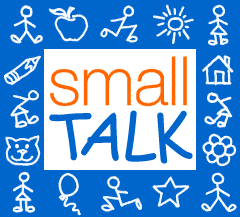When most children learn to talk, they go through a normal "phase" in which they repeat words or phrases. This usually happens between the ages of two and five. This phase can last a few days or even weeks. Some children may not outgrow this phase and may in fact have a "true stuttering" problem.
How can a parent tell if their child is going through a normal "phase" or if it is "true stuttering?"
You can sometimes tell the difference between a normal "phase" and a "true stuttering" problem by looking at how often a child stutters and in what way. This may need to be done over a period of time. A Speech Language Pathologist can help to determine a stuttering problem. If you are worried that your child might be stuttering, call 519-272-8216 or 1-866-333-7716 and ask for smallTALK.
How can a parent with these concerns help their child?
- Be a good listener. Focus on what your child is saying, rather than how he/she is saying it.
- Try not to fill in words for your child. This may frustrate your child, especially if you have guessed the wrong word.
- Avoid telling your child to "slow down" or "take it easy". This may make your child feel more anxious.
- Give your child plenty of time to talk without interruption.
- Encourage children to take turns talking, especially if brothers and sisters are competing for talk time.
Facts About "True Stuttering"
- About 5% of children stutter.
- Three to 4 times as many boys as girls stutter.
- Stuttering tends to run in families.
- Stuttering seems to be caused by a physical problem, not an emotional one.
- Stuttering may be worse when a child is tired, sick, anxious or excited.
- Early help can make a difference. A Speech Language Pathologist can assist a child and his/her parents, teachers and others involved to understand and deal effectively with a stuttering problem.

